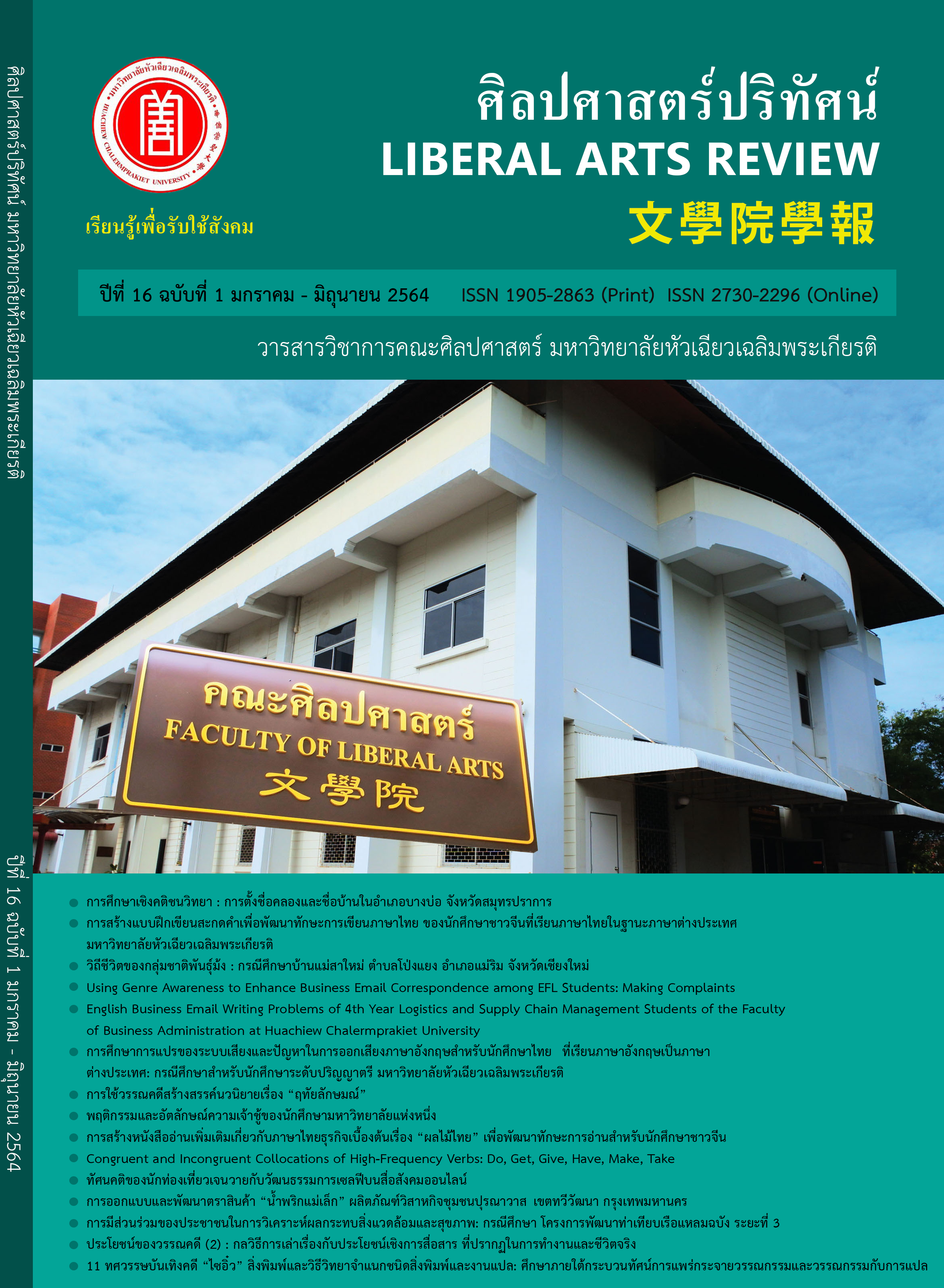Using Genre Awareness to Enhance Business Email Correspondence among EFL Students:
Making Complaints
Keywords:
Business Correspondence, Email Writing, Foreign Language Writing, Genre Awareness, Moves and StepsAbstract
Global business communication relays on correspondence with English and other major languages through electronic means leading blooming of EFL teaching for ESP. Lertchalermtipakoon et al. (2018) applied that the use of generic teaching with moves and steps in business email writing tasks aiming to arranging meeting and replying the meeting arrangement. The study was resulted that the teaching method was positively effective, nevertheless more studies with various tasks and more samples would be solidified the outcome. In this study, the data was gathered from a class of business writing students by assigning three complaint email writing tasks that the students wrote independently: (1) a task assigning before a session of teaching, (2) a task assigning after intervening genre-based approach with examples of moves and steps, and (3) a task assigning one week after teaching to examine knowledge they acquired. The first task was to stimulate students to initially fulfill the task with their L1 and L2 knowledge. The second task was to investigate that an explicit teaching and supplying them with generic structure (moves and steps) would effectively enhance their understanding. The final task was to assert the students’ knowledge acquisition, to review their lesson, and to explore more examples. Based on the data collected from students’ post-test A after the class and post-test B in a week after, the findings revealed that the distinct pedagogy of moves and steps dramatically and continuously enhanced students’ ability to fulfill the tasks. The study discussed that the outcomes of students were the significant result of a unification of genre recognition, moves and steps, and practicing familiar tasks. These factors highly served as crucial pedagogical instruments helping students to perceive and acquire proper writing styles.
References
Amnuai, W., & Wannaruk, A. (2012). Investigating move structure of English applied linguistics research article discussions published in international and Thai journals. English Language Teaching, 6(2), 1.
Barnard, R., & Meehan, A. (2013). Writing for the real world: An introduction to business
writing. China: Oxford University Press.
Bhatia, V. (1993). Analyzing genre: Language use in professional settings. London: Longman.
Hyland, K. (2004). Genre and second language writing. University of Michigan Press.
Kanoksilapatham, B. (2007). Writing scientific research articles in Thai and English: Similarities and differences. Silpakorn University International Journal, 7, 172-203.
Lertchalermtipakoon, P., Kawinvasin, S., Pochote, S., & Chinorak, V. (2018). Developing Genre
Awareness for Business Email Correspondence. In Proceedings of the 5th International Foreign Language Learning and Teaching Conference (FLLT), Language Institute, Thammasat University (pp. 100-110).
Lieungnapar, A., & Watson Todd, R. (2011). Top-down versus bottom-up approaches toward move analysis in ESP. In Proceedings of the International Conference on Doing Research in Applied Linguistics, King Mongkut’s University of Technology Thonburi (pp. 21-22).
Littlejohn, A. (2015). Company to company: A task-based approach to business emails,
letters and faxes. Italy: Cambridge University Press.
Malakul, K., & Bowering, M. (2006). The application of genre theory to improve academic
English writing courses.
Panseeta, S., & Todd, R. W. (2014). A genre analysis of 5-star hotels’ responses to negative reviews on Tripadvisor. REFlections, 18, 1-13.
Pasavoravate, Y. (2011). Genre analysis of thesis and dissertation abstracts in linguistics written by students in Thailand and students in England (Doctoral dissertation, Chulalongkorn University).
Promsin, P. (2006). An analysis of moves and modality in English engineering abstracts. NIDA Language and Communication Journal, 11(1). 43-61.
Swales, J (1990). Genre analysis: English in academic and research settings. Cambridge:
Cambridge University Press.
Swales, J. M. (2004). Research genres: Explorations and applications. Cambridge University Press.
Zand-Vakili, E., & Kashani, A. F. (2012). The contrastive move analysis: An investigation of
Persian and English research articles’ abstract and introduction parts. Mediterranean Journal of Social Sciences, 3(2), 129-137.
Downloads
Published
How to Cite
Issue
Section
License
บทความที่ได้รับการตีพิมพ์เป็นลิขสิทธิ์ของวารสารศิลปศาสตร์วิชาการและวิจัย
ข้อความที่ปรากฏในบทความแต่ละเรื่องในวารสารวิชาการเล่มนี้เป็นความคิดเห็นส่วนตัวของผู้เขียนแต่ละท่านไม่เกี่ยวข้องกับมหาวิทยาลัยหัวเฉียวเฉลิมพระเกียรติ และคณาจารย์ท่านอื่นๆ ในมหาวิทยาลัยฯ แต่อย่างใด ความรับผิดชอบองค์ประกอบทั้งหมดของบทความแต่ละเรื่องเป็นของผู้เขียนแต่ละท่าน หากมีความผิดพลาดใดๆ ผู้เขียนแต่ละท่านจะรับผิดชอบบทความของตนเองแต่ผู้เดียว




